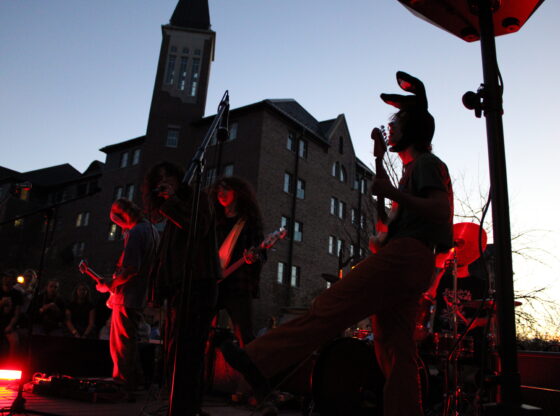The two-piece garage-rock/queercore outfit PWR BTTM, composed of members Ben Hopkins and Liv Bruce, have been the subject of much scrutiny due to recent sexual assault allegations. The allegations came as a surprise to many of PWR BTTM’s following, considering their leftist lyricism, gender neutrality and general counter-culture aesthetic.
Bruce and Hopkins have become, to a degree, poster children of indie queerness. Ben Hopkins recognizes themself as non-gender-binary and often performs with dresses in high color, wearing heavily smeared lipsticks and using a rainbow guitar strap in reference to the LGBTQ community. Their stage ensembles are akin to the prismatic effervescence of Denver’s own indie-darlings Decollage. Despite the seeming contradiction between the allegation and their liberality, members of the LGBTQ community are more susceptible to sexual violence than cisgendered people, and Hopkins is no exception. Hopkins has a history of racial derogation; in 2011 a photo of Hopkins posing next to a swastika went viral, followed by an imploring “I’m so so sorry” tweet. Moreover, Hopkins has often been accused of being “too touchy” with audience members during PWR BTTM’s sets by fans, friends and members of fellow touring bands.
The investigation began May 12 (two days after the release of their album “Pageant”) which has since been pulled from retail. A Jezebel article was released detailing an interview with an anonymous woman who claims Hopkins assaulted her while she was sleeping and refused to wear protection. By May 13 the band was dropped from their management and label, and their entire tour was canceled, including a July 27 show at the Bluebird Theater. After a week-long hiatus, Hopkins responded to the Jezebel article on May 18 with a public Facebook post:
“I am firmly committed to consent, to communication, and to mutual expression of sexual interest. The accusations in Jezebel directly conflict with my experience, as it is not my practice to engage in sexual contact without protection, without discussing the issue with my partner, or to engage in the other conduct alleged in the Jezebel article.”
Although Hopkins’s tone was sincere, perhaps mildly apathetic, and they “fully appreciate(s) that someone’s views about the dynamics of intimate interactions can change and are not always apparent in the moment,” they firmly denied the allegations made. Hopkins refuted their own principles of consensual sex and went so far as to include in their Facebook post that “the statements made about me did not line up with any sexual experience I have ever had.”
Since the Jezebel article, bands Nnamdi Ogbonnaya and T-Rextasy have announced that they are no longer comfortable touring with PWR BTTM, and they expressed regrets of not having ended their relationship with Hopkins and Bruce earlier, despite firm warnings from other members of the music community. Others, including Jezebel writer Kitty Cordero-Kolin, have privately claimed Hopkins to be “a known sexual predator” in a private Facebook group, which was screenshotted and later shared by NPR. A lawsuit can be expected in the coming months to legally determine if Hopkins is as innocent as they have claimed to be.
According to the latest research performed by the HRC, 46 percent of bisexual women have been raped, compared to 17 percent of heterosexual women. 40 percent of gay men and 47 percent of bisexual men have experienced sexual violence other than rape, compared to 21 percent of heterosexual men. Sadly, those on the frontiers of the fight for gender and sexual liberation are too often in danger of sexual assault. Due to a lack of legal and social protection (for example, women’s shelters in the U.S. widely do not accept trans-women), the LGBT community is not always the utopic, radically free society it may appear to be, as it butts up against a world of wildly disproportionate powers and disenfranchisement.
Perhaps Hopkins’s position of power as a public figure and leader of the queer community was a facade too well-fitting; the perfect identity to hide their predatory behavior beneath. Hopkins may have become too friendly with the social power that can result from the inversions of fame and pedestaling. However, the response and backlash that has resulted prove our progress as a society; not only are we willing to talk about sexual assault and violence openly, but the community has collectively removed a predator from their position in power. It is nonetheless disheartening, but hopefully the trespasses and subsequent consequences PWR BTTM incurred will encourage more sexual assault victims to speak out against their injustice.











